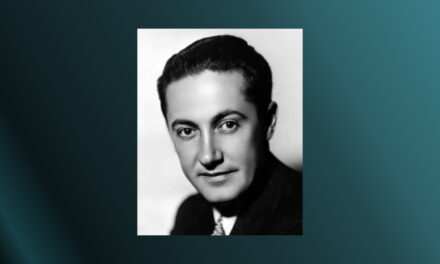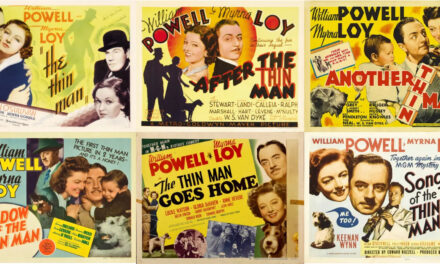
The Only Movies to Win All Big 5 Oscars
Since the Academy Awards debuted in 1929, only three movies have swept the so-called Big 5 Oscars, winning the golden statuettes for Best Picture, Performance by an Actor in a Leading Role, Performance by an Actress in a Leading Role, Directing, and Writing (either Adapted Screenplay or Original Screenplay)
The three great films that claimed the Big 5 Oscars are It Happened One Night (1934), One Flew Over the Cuckoo’s Nest (1975), and The Silence of the Lambs (1991).
For a movie to be nominated in all of the Big 5 Oscar categories, let alone win them, is exceptional. Only 43 films have ever been nominated for all five awards.
1967 and 1981 were banner years for Big 5 nominations, with three movies from each of those years being nominated. In five other years, two movies received the Big 5 nominations (1939, 1940, 1951, 1974, and 1976). Not surprisingly, given the competition, none of the nominated films in any of these years swept the five categories.
Out of the 40 movies that received nominations in all the Big 5 Oscar categories but did not win them all, four came close with four Oscars, six won three, eleven won two, eleven won one, and eight were shut out completely.
Given this history, the achievements of the people who made the three Big 5 Oscar winners are especially remarkable.
'It Happened One Night' (1934)
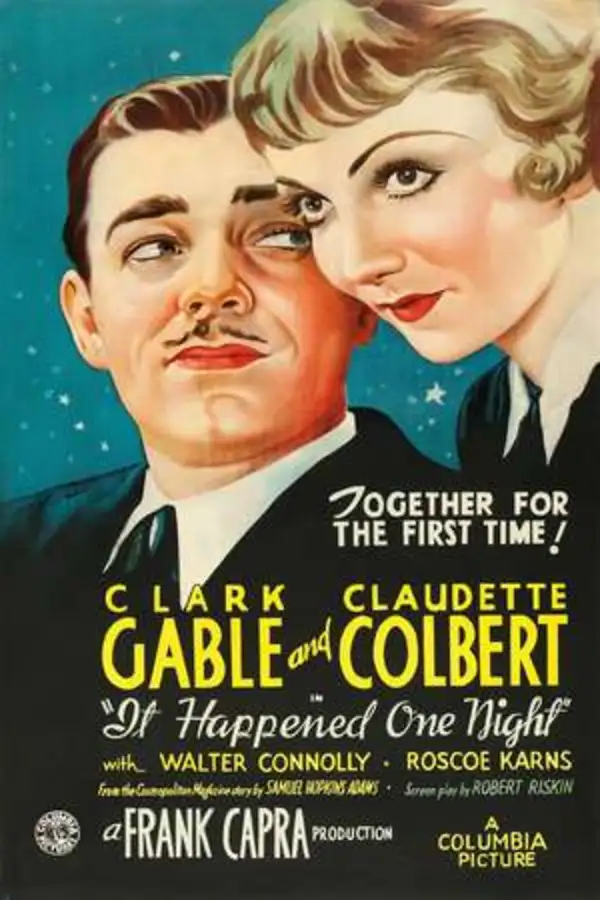
Movie poster for 'It Happened One Night.' Columbia Pictures, 1934.
It Happened One Night, a romantic comedy, was the first film to win the Big 5 Oscars, taking home the top prizes at the 7th Academy Awards in 1935.
- Outstanding Production (Best Picture): Columbia
- Actor: Clark Gable
- Actress: Claudette Colbert
- Directing: Frank Capra
- Writing (Adaptation): Robert Riskin
The movie did not receive any other Oscar nominations, but it did win a handful of other nominations and awards.
What Is 'It Happened One Night' About?
Wealthy socialite Ellie Andrews (Claudette Colbert) has married King Westley (Jameson Thomas), a fortune-hunting aviator, against the wishes of her father (Walter Connolly). Ellie’s father takes her to his yacht in Miami to separate her from her husband before the marriage is consummated, but Ellie dives overboard and manages to elude her father and get on a bus to New York to reunite with Westley. Her father offers a reward for her return.
On the bus, she meets reporter Peter Warne (Clark Gable). Peter realizes who Ellie is when a thief steals her purse and she doesn’t report it to the police. Peter offers to help her get to New York in exchange for her exclusive story, threatening to contact her father for the reward money if she doesn’t agree. Ellie agrees to have him help her, and they continue together to New York.
The Iconic Hitchhiking Scene
The couple shares numerous adventures and comic misadventures in their travels. Among the highlights is the famous hitchhiking scene in which Ellie shows Peter how easily she can get a car to stop for them, after he has failed, by raising her skirt to show her leg.
As they travel, they share hotel rooms pretending to be husband and wife. Peter sets up a rope and blanket between their beds that he nicknames “the walls of Jericho.” Those familiar with the Biblical story know that the walls of Jericho ultimately come tumbling down, so viewers may anticipate an eventual change in Ellie and Peter’s relationship.
It Happened One Night makes serious points about social class and the Great Depression, but it is also a lot of fun. It features some classic screwball plot turns and clever comic banter between Ellie and Peter. It is one of the last Pre-Code films, released just four months before the Motion Picture Production Code began to be rigidly enforced in July 1934.
Actor: Clark Gable
Clark Gable’s Oscar nomination for It Happened One Night was his first of three, but it was his only win. He was also nominated for Mutiny on the Bounty in 1935 and for his best-known role as Rhett Butler in 1939’s Gone With the Wind.
Gable (1901–1960) was one of the most popular movie stars throughout the 1930s and ’40s, even being voted “The King of Hollywood” in a 1938 poll. He remained a box office draw throughout his career. His last film, The Misfits (1961), was completed shortly before his death and was also the last film of co-star Marilyn Monroe.
Actress: Claudette Colbert
Claudette Colbert (1903–1996) moved with her family at the age of three to the United States from her native France. Her acting career began on Broadway in 1923. In 1927, she appeared in Frank Capra’s silent film, The Love of Mike, and she left Broadway for the movies shortly thereafter.
Like Gable, Colbert received her first Oscar nomination and only win for It Happened One Night. She was nominated again for 1935’s Private Worlds and 1944’s Since You Went Away but did not win.
Colbert continued acting into her 80s, winning a Golden Globe for Best Actress in a Supporting Role for the 1987 TV movie The Two Mrs. Grenvilles.
Directing: Frank Capra
Frank Capra (1897–1991), a native of Sicily whose family immigrated to the United States when he was a child, directed over 50 films and was also a producer and writer. He received six Academy Award nominations for Directing and won three Oscars.
His win for It Happened One Night was his first; it was followed by Oscars for Mr. Deeds Goes to Town (1936) and You Can’t Take It With You (1938). Generally considered one of the all-time best Hollywood directors, Capra received the American Film Institute’s Life Achievement Award in 1982.
Writing (Adaptation): Robert Riskin
Robert Riskin’s screenplay for It Happened One Night was an adaptation of a short story by Samuel Hopkins Adams.
Riskin (1897–1955) began his show business career as a playwright in New York. When Columbia Pictures bought the rights to several of his plays, he moved to Hollywood. He received five Oscar nominations for Best Writing—all for films directed by Frank Capra—but his screenplay for It Happened One Night earned him his only win.
'It Happened One Night'—Did You Know?
- Clark Gable and Claudette Colbert were not the first choices for the lead roles. Several actors turned down the film, including Robert Montgomery and Myrna Loy, who did not like the script. Gable was under contract to MGM for $2,000 a week whether he worked or not, but MGM had no upcoming projects for him and lent him to Columbia for a fee in order to recoup his salary.
- Colbert initially did not want to film the scene where she pulls up her skirt to get a ride, so a body double was used to film the scene. When she saw the footage, Colbert did not think the double’s leg looked like hers, so she decided to film the iconic scene herself.
- Colbert did not attend the Academy Awards because she felt she had no chance of winning. Instead, she planned to take a railroad trip across the country. When she won, the studio managed to pull her off the train, which had not yet departed, and brought her to the awards.
'One Flew Over the Cuckoo's Nest' (1975)
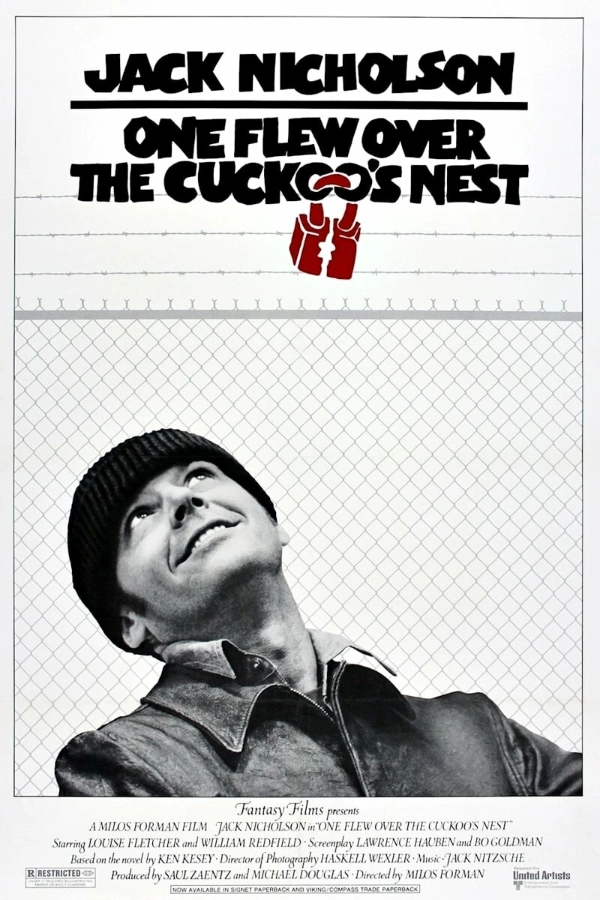
Movie poster for 'One Flew Over the Cuckoo's Nest.' Fantasy Films and United Artists, 1975.
At the 48th Academy Awards in 1976, One Flew Over the Cuckoo’s Nest became the second film to win the Big 5 Oscars.
- Best Picture: Saul Zaentz and Michael Douglas, Producers
- Actor: Jack Nicholson
- Actress: Louise Fletcher
- Directing: Miloš Forman
- Writing (Screenplay Adapted from Other Material): Lawrence Hauben and Bo Goldman
The film was nominated for four additional Oscars: Actor in a Supporting Role—Brad Dourif, Cinematography—Haskel Wexler and Bill Butler, Film Editing—Richard Chew, Lynzee Klingman, and Sheldon Kahn, and Music (Original Score)—Jack Nitzsche.
What Is 'One Flew Over the Cuckoo's Nest' About?
R.P. McMurphy (Jack Nicholson), in prison for statutory rape, is transferred for observation to a mental institution where he assumes he will serve his time in relative comfort.
The ward to which he is assigned is overseen by the rigid, autocratic Nurse Ratched (Louise Fletcher), who bullies the patients through humiliation, punishments, and routine. The patients live in fear of her and have completely submitted to her control.
McMurphy vs. Nurse Ratched
The anti-authoritarian McMurphy engages Nurse Ratched in a battle of wills on behalf of the other patients. He forms friendships with two patients in particular: young, suicidal stutterer Billy Bibbit (Brad Dourif) and schizophrenic, mute Native American “Chief” Bromden (Will Sampson).
While McMurphy and Chief are awaiting shock therapy, McMurphy discovers that Chief can speak, so he lets him in on an escape plan. One night McMurphy gets his girlfriend to sneak into the ward to bring alcohol and to initiate a getaway. Unfortunately, the patients drink too much and pass out. The resulting mess brings more cruelty from Nurse Ratched that leads to tragedy.
One Flew Over the Cuckoo’s Nest is a drama that asks serious questions about mental illness, freedom, and authority. Although the underlying subject matter is grim, the film is leavened with humor and enlivened by great performances.
Actor: Jack Nicholson
One of the top movie actors of all time and a recipient of a Life Achievement Award from the American Film Institute, Jack Nicholson (b. 1937) has received 12 Oscar nominations to date. His first came in the Best Supporting Actor category for 1969’s Easy Rider.
Nicholson’s Oscar for One Flew Over the Cuckoo’s Nest was his first Academy Award win. He also won a Best Supporting Actor Oscar for Terms of Endearment (1983) and won his second Oscar for Best Actor in a Leading Role for 1997’s As Good as It Gets.
Actress: Louise Fletcher
Louise Fletcher (1934–2022) appeared in over 120 movie and television productions. Although One Flew Over the Cuckoo’s Nest yielded her only Oscar nomination, she was nominated for two Primetime Emmy Awards for her work as a guest actress in the 1990s TV series Picket Fences and again for her 2003 appearance in the series Joan of Arcadia.
Best Directing: Miloš Forman
Miloš (pronounced ME-lōsh) Forman (1932–2018) made several films in his native Czechoslovakia before leaving for the United States in 1968 in reaction to the invasion of Czechoslovakia by Warsaw Pact forces. Both of his parents had died in Nazi concentration camps during World War II.
In addition to winning the Academy Award for One Flew Over the Cuckoo’s Nest, he also won the Directing award for Amadeus (1984), which won eight Oscars, including four of the Big 5 awards—missing out only on the Best Actress award.
Forman received his third Directing nomination for the 1996 film The People vs. Larry Flynt but did not win the Oscar.
Writing (Screenplay Adapted from Other Material): Lawrence Hauben and Bo Goldman
Lawrence Hauben and Bo Goldman adapted the screenplay for One Flew Over the Cuckoo’s Nest from Ken Kesey’s 1962 novel of the same name.
Hauben (1931–1985) was a writer and occasional actor, appearing in the 1967 Lee Marvin movie Point Blank. One Flew Over the Cuckoo’s Nest was his only screenwriting credit.
Goldman (1932–2023), by contrast, was a prolific and much-honored screenwriter. He received another Oscar for 1980’s Melvin and Howard and was nominated for 1992’s Scent of a Woman. The Writers Guild of America honored him with the Laurel Award for Screen Writing Achievement in 1998.
'One Flew Over the Cuckoo's Nest'—Did You Know?
- Kirk Douglas, who played the role of McMurphy in the Broadway stage adaptation, bought the film rights for the novel in the early 1960s, shortly after it was originally published. He was unable to find a studio willing to produce the film, and he eventually sold the rights to his son, Michael. Kirk was considered too old for the lead role by the time the film was ready to be produced.
- Ken Kesey, the author of the novel, clashed with producers over the casting, as well as the change in the narrative point of view. (The novel was written from the perspective of Chief Bromden.) Kesey claimed to have never seen the film, and he actually sued the producers over the changes.
- The movie was filmed in the actual setting of the novel, Oregon State Hospital in Salem.
'The Silence of the Lambs' (1991)
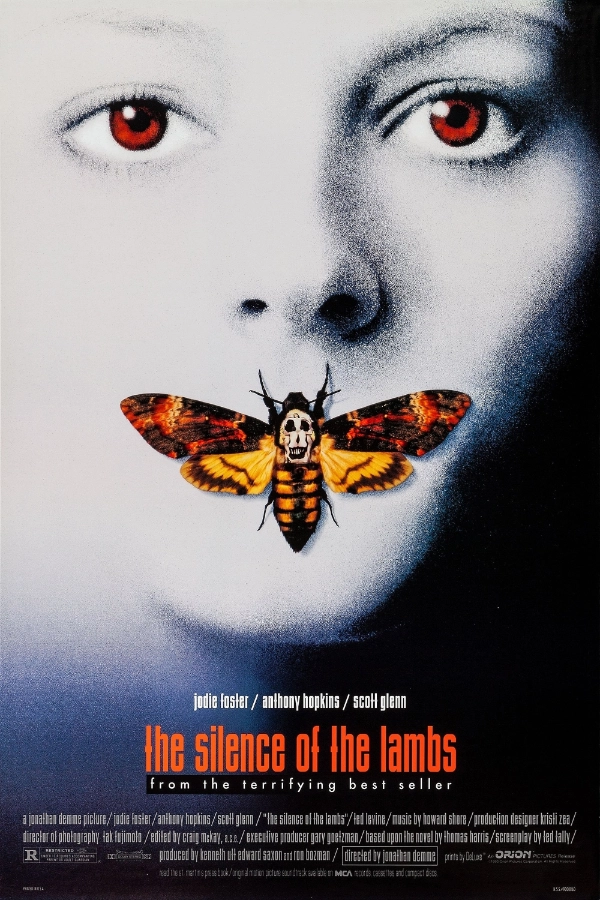
Movie poster for 'The Silence of the Lambs.' Strong Heart Productions / Orion Pictures, 1991.
The 64th Academy Awards in 1992 saw the crime thriller The Silence of the Lambs become the third recipient of all Big 5 Oscars.
- Best Picture: Edward Saxon, Kenneth Utt, and Ron Bozman, Producers
- Actor in a Leading Role: Anthony Hopkins
- Actress in a Leading Role: Jodie Foster
- Directing: Jonathan Demme
- Writing (Screenplay Based on Material Previously Produced or Published): Ted Tally
The film also received Oscar nominations for Film Editing (Craig McKay) and Sound (Tom Fleischman and Christopher Newman), and it won numerous other industry, critics’, and popular awards.
What Is 'The Silence of the Lambs' About?
The FBI is trying to apprehend a serial killer nicknamed “Buffalo Bill” (Ted Levine) who skins his female victims. Young FBI trainee Clarice Starling (Jodie Foster) is assigned to interview Dr. Hannibal Lecter (Anthony Hopkins), a brilliant but psychopathic psychiatrist turned serial killer, in hopes that Lecter will profile Buffalo Bill.
Lecter is incarcerated in an ultra-secure cell in the Baltimore Hospital for the Criminally Insane. Starling travels to Baltimore and meets with Lecter, who initially refuses her attempts to obtain information. However, he offers to give her clues and insights about Buffalo Bill in exchange for Starling revealing information about herself.
Clarice Starling vs. Hannibal Lecter
The manhunt for Buffalo Bill intensifies with the abduction of a U.S. senator’s daughter. Since Lecter has been seeking a transfer to another facility, Starling is authorized to pretend that he will be transferred in return for additional help in catching Buffalo Bill.
However, Dr. Frederick Chilton (Anthony Heald), the director of the Baltimore hospital, undercuts Starling with a deal of his own, transferring Lecter to Memphis, where Lecter provides information to federal agents about Buffalo Bill.
When Starling visits Lecter in Memphis and reveals more information about her childhood, Lecter gives her annotated case files on Buffalo Bill. Starling’s analysis of his notes brings her closer to finding Buffalo Bill, but her visit also puts her at risk from Lecter.
The Silence of the Lambs is a thriller in which the tension builds from beginning to end. Like Starling, the audience is both horrified and fascinated by the psychopathic Lecter. Even after repeat viewings, the movie does not disappoint.
Actor in a Leading Role: Anthony Hopkins
Welsh actor Anthony Hopkins (b. 1937) was a member of the National Theatre in London with Sir Laurence Olivier. He has appeared in numerous films since his 1967 movie debut.
In addition to his win for The Silence of the Lambs, Hopkins won a second Oscar for his performance in the 2020 film The Father. He has four other Academy Award nominations to his credit for his work in The Remains of the Day (1993), Nixon (1995), Amistad (1997), and The Two Popes (2019).
Actress in a Leading Role: Jodie Foster
Jodie Foster (b. 1962) began acting as a child. In fact, she received her first Academy Award nomination when she was only 12 years old, a Best Supporting Actress nod for her role as a child prostitute in Taxi Driver (1976). Her Oscar for The Silence of the Lambs was her second Oscar. She had previously won an Oscar for 1988’s The Accused. She has subsequently received nominations for her performances in Nell (1994) and Nyad (2023).
A graduate of Yale University, Foster was touched by tragedy during her freshman year (1981) when obsessive fan John Hinckley attempted to assassinate U.S. President Ronald Reagan in a misguided effort to impress her.
Directing: Jonathan Demme
Jonathan Demme (1944–2017) directed numerous feature films, documentaries, television shows, and music videos in his career. His Oscar for The Silence of the Lambs was his only Academy Award and only nomination.
Among Demme’s other best-known films are Melvin and Howard (1980), the Talking Heads concert movie Stop Making Sense (1984), Philadelphia (1993), The Manchurian Candidate (2004), and Rachel Getting Married (2008).
Writing (Screenplay Based on Material Previously Produced or Published): Ted Tally
Playwright and screenwriter Ted Tally (b. 1952) adapted the screenplay for The Silence of the Lambs from the 1988 novel of the same name by Thomas Harris.
Tally has written screenplays for eight theatrical and TV films, including the Hannibal Lecter prequel, Red Dragon (2002). In addition to numerous awards for the screenplay for The Silence of the Lambs, Tally won several critics’ awards for his screenplay for All the Pretty Horses (2000).
'The Silence of the Lambs'—Did You Know?
- Jodie Foster was the director’s fourth choice for the role of Clarice Starling. Jonathan Demme initially wanted Michelle Pfeiffer, Meg Ryan, or Laura Dern. Pfeiffer and Ryan rejected the role because they were not comfortable with the material. The studio rejected Dern because they felt she was not a bankable star.
- Scott Glenn, who plays Jack Crawford in the film, visited an FBI facility in Quantico to prepare for the role. He listened to recordings from serial killers Lawrence Bittaker and Roy Norris. The recordings reportedly made him weep and made him change his opinion to support the death penalty.
- Anthony Hopkins won the Oscar despite only having 16 minutes of screen time. His performance as Hannibal Lecter is ranked number one on the American Film Institute’s list of greatest screen villains.
Will There Be Another Movie to Win All Big 5 Oscars?
The most recent movie to receive nominations in all the Big 5 Oscar categories was 2016’s La La Land, which was nominated for 14 Oscars total. In what was probably the most notorious flub in the history of Academy Award presentations, La La Land was initially announced as the winner for Best Picture due to an envelope mix-up. As it turned out, the real winner was Moonlight. La La Land came away with six Oscars but only two of the Big 5.
The greatest challenge in winning the Big 5 Oscars appears to be winning the two acting awards. Only three other movies besides the three Big 5 winners have won Oscars for both Best Actor and Best Actress:
- Network (1976): Peter Finch and Faye Dunaway
- Coming Home (1978): Jon Voight and Jane Fonda
- On Golden Pond (1981): Henry Fonda and Katharine Hepburn
Moreover, the four movies that got nominations for all five Big 5 Oscars but won only four of them all missed out because they won only one of the two acting awards:
- Gone with the Wind (1939): Best Actor nominee Clark Gable lost to Robert Donat (Goodbye, Mr. Chips)
- Mrs. Miniver (1942): Best Actor nominee Walter Pidgeon was bested by James Cagney (Yankee Doodle Dandy)
- Annie Hall (1977): Best Actor nominee Woody Allen was beaten out by Richard Dreyfus (The Goodbye Girl)
- American Beauty (1999): Best Actress nominee Annette Bening lost to Hilary Swank (Boys Don’t Cry)
Another film will probably win the Big 5 Oscars at some point, but it will require a great screenplay with meaty roles for the lead actor and actress and a director who can bring out their best performances. If all those elements align, there could again be a movie that wins all Big 5 Oscars.
Copyright © Brian Lokker 2011, 2025. An earlier version of this article was published on HubPages.com in 2011 and was subsequently featured on ReelRundown.com.
“Oscar” is a registered trademark of The Academy of Motion Picture Arts and Sciences.

